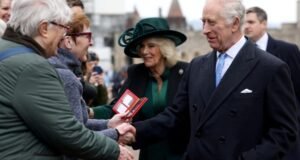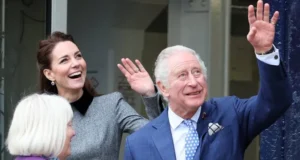
Boris Johnson will seek a general election later if Labour and rebel Tories succeed in seeking to block a no-deal Brexit on 31 October.
The PM has said he will not accept another Brexit delay but a bill forcing him to seek an extension if there is no deal is set to be approved by MPs.
He needs two-thirds of MPs to trigger an election, but Labour and other parties won’t back it at this stage.
The decision to expel 21 Tory rebels has caused recriminations in the party.
The group of senior former ministers, including ex-chancellors Philip Hammond and Ken Clarke, have insisted they put the national interest ahead of their own.
But minister Kwasi Kwarteng said it was right the MPs had had the whip withdrawn, as they could not oppose the government on “the key policy issue of the day”.
On another day of high drama in Westminster, Boris Johnson is facing his first session of Prime Minister’s Questions after losing his Commons majority on Tuesday.
The showdown between the government and opponents of a no-deal Brexit will continue later as Labour and other opposition parties seek to pass a bill requesting a further delay if there is no deal by 19 October.
A total of 21 Tories defied the PM on Tuesday to vote with the opposition as Mr Johnson suffered his first Commons defeat as prime minister by a margin of 328 votes to 301.
If the Brexit delay bill passes later on and moves to the Lords, as is expected, Mr Johnson will push for an immediate vote on an early general election.
After Monday’s defeat, he told MPs he had no choice but to press ahead with efforts to call an October election, adding: “The people of this country will have to choose.”
But Labour say this is a “trap” and it will only agree to a poll – which it is understood No 10 plans for 15 October – once the chance of a no-deal Brexit next month has been ruled out.
Shadow Brexit Secretary Sir Keir Starmer told BBC Radio 4’s Today that Labour wanted a general election but “on its terms not Boris Johnson’s terms”.
He said the party did not “trust” the PM to hold the election before the Brexit deadline, as No 10 had “lied” last month when it denied reports that it planned to suspend Parliament.
“We are not shy of a general election but we are not going to be trapped into abandoning control of Parliament or be taken in what Boris Johnson says because we don’t trust him.”
But, at a meeting in London, a succession of Labour MPs called on the leadership to hold off backing an election until after Brexit had been delayed.
The BBC’s Chris Mason said one MP reportedly told colleagues: “Johnson said it is Brexit do or die on October 31st. I want him to die.”
Under the Fixed Term Parliaments Act, a prime minister must have the backing of at least two-thirds of the UK’s 650 MPs before a poll can be called outside of the fixed five-year terms.
The Lib Dems say they will vote against an early election at this stage while the SNP said they were ready for an election – but only after a no-deal Brexit was “taken off the table”.
Downing Street said the 21 Tory MPs who rebelled in Tuesday’s vote would have the whip removed, effectively expelling them from the parliamentary party and meaning they could not stand as Conservative candidates in the election.
Among the jettisoned rebels are former justice secretary David Gauke, Winston Churchill’s grandson Sir Nicholas Soames, and Rory Stewart, who recently stood against Boris Johnson to be the party leader.
The former international development secretary told the Today programme he was sacked by text message, as he was being given the GQ magazine award for politician of the year.
“It was a pretty astonishing moment,” he said. “It feels a little bit like something you associate with other countries – one opposes the leader, one loses the leadership race, no longer in the cabinet and now apparently thrown out of the party and one’s seat too.”
Mr Stewart said the decision to stop him standing as a candidate was “un-Conservative” and the final decision should rest with local associations and not be made centrally.
Another of the rebels, Richard Benyon, said he would continue to sit on the Tory benches and support the PM’s domestic agenda, saying he hoped to return to the fold “one day”.
But there have been calls from loyal MPs for No 10 to rethink its conduct amid anger over the treatment of rebels and the suspension of Parliament.
Sir Roger Gale said Dominic Cummings, one of Mr Johnson’s closest advisers, had “abused and swore” at Tory rebels and should be disciplined.
“The fact that you have at the heart of No 10 as the PM’s senior advisor an unelected, foul-mouthed oaf throwing his weight around is completely unacceptable,” he told the BBC.
“If the PM doesn’t have Dominic Cummings frogmarched out of Downing Street himself then the chances are it not be the Tory rebels or Jeremy Corbyn but Mr Cummings who will bring down this administration.”
Ruth Davidson, the outgoing leader of the Scottish Conservatives, criticised the decision to throw out dissident MPs, tweeting:
Hours before the vote on Tuesday, the government had already lost its working majority when Tory MP Phillip Lee defected to the Liberal Democrats.
Media captionThe moment MPs voted to take control of the Commons
Chancellor Sajid Javid will also outline the government’s spending plans for the next year later in the Commons, with the health service, education and the police expected to fare well.
Could the Commons defeat be a benefit to PM?
It’s hard to know where to start sometimes.
The pace and gravity of events in Westminster this week is both monumental and dizzying.
A prime minister has lost his wafer of a majority.
But some close to the prime minister believe that from this crisis comes an opportunity – to close the unfinished business of the referendum result in 2016, with the Tory party at last being the bearers of a crystal-clear message on Brexit.
It’s a measure of how upside down the political norms are – that the prime minister losing his first vote in office is considered by some of his allies as a benefit.
Don't Miss
 Weekly Bangla Mirror | Bangla Mirror, Bangladeshi news in UK, bangla mirror news
Weekly Bangla Mirror | Bangla Mirror, Bangladeshi news in UK, bangla mirror news






